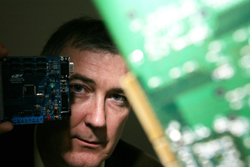Duolog Technologies, the NovaUCD-headquartered Collaborative Design Automation™ company announced today that it has acquired, in a combined cash and equity deal, the technology and products of Beach Solutions Ltd as part of its global expansion strategy.
Beach Solutions is a privately held, UK-based, Electronic Design Automation (EDA) company established in 1998 which offers register management solutions for System-on-Chip (SoC) design. Having raised over £6 million in venture capital funding Beach researched and developed innovative products that are used by major semiconductor companies in Europe, US and Asia.

Ray Bulger, co-founder & CEO, Duolog Technologies
Duolog Technologies develops software tools that enable chip design companies to design their products faster, at lower cost and with fewer bugs. As part of its international expansion plans Duolog opened a sales, marketing and support office in Los Gatos, California last year. With this new acquisition Duolog has established a significant presence in the key Asian market. During the coming year Duolog intends to accelerate sales and to grow its revenues to $15 million.
Speaking about the acquisition, Ray Bulger, co-founder and CEO of Duolog Technologies said, “This is an important and extremely beneficial acquisition for Duolog. We have added valuable functionality to our products, further strengthened our client portfolio and attained an instant presence in the Japanese market, a major global market for EDA software and complex IC design, where Beach already had a strong presence.” He added, “We are fully committed to supporting existing Beach customers and have taken on key members of the Beach team to achieve this.”
Ray Bulger concluded, “The market for EDA tools for chip integration is maturing. As the market embraces IP-centric flows, more and more semiconductor companies are recognising the savings and productivity gains to be made by replacing overstretched, internal CAD solutions with standards-based, scalable, off-the-shelf products. As the market matures, there will inevitably be consolidation and Duolog, with our award-winning products, is in an excellent position to drive this consolidation.”
Duolog Technologies currently employs more than 80 people and is headquartered at NovaUCD, the Innovation and Technology Transfer Centre at University College Dublin. Duolog also has design centres in Galway and Budapest, Hungary, as well as US and international operations.
ENDS
20 January 2009
Editors Notes
Duolog Technologies, the Collaborative Design Automation™ Company, is an award-winning developer of groundbreaking EDA tools that enable the flawless and rapid integration of today’s increasingly complex SoC, ASIC and FPGA designs. Duolog’s Socrates chip integration platform employs a modular and extensible suite of tools for IO layer definition, IP packaging, connectivity and register management. The Socrates tools, built on the Eclipse platform and supporting the IP-XACT standard, shorten design cycles, reduce costs and greatly improve design quality through their Perfect-By-ConstructionTM methodology.
Beach Solutions Ltd was founded in the UK in 1998 by a team of highly experienced design engineers. Beach quickly established itself as a pioneering force in SoC design automation and was a founding member of the SPIRIT consortium, an industry group dedicated to defining a standardised way to describe design IP (IP-XACT). With the aid of over £6 million in VC funding, Beach researched and developed innovative products that are used by major semiconductor companies in Europe, the US and Asia.
NovaUCD is University College Dublin’s €11 million Innovation and Technology Transfer Centre. Twenty-five knowledge-intensive companies, including Duolog Technologies are currently located in NovaUCD. NovaUCD has been funded through a unique public-private partnership that includes AIB Bank, Arthur Cox, Deloitte, Enterprise Ireland, Ericsson, Goodbody Stockbrokers, UCD and Xilinx.